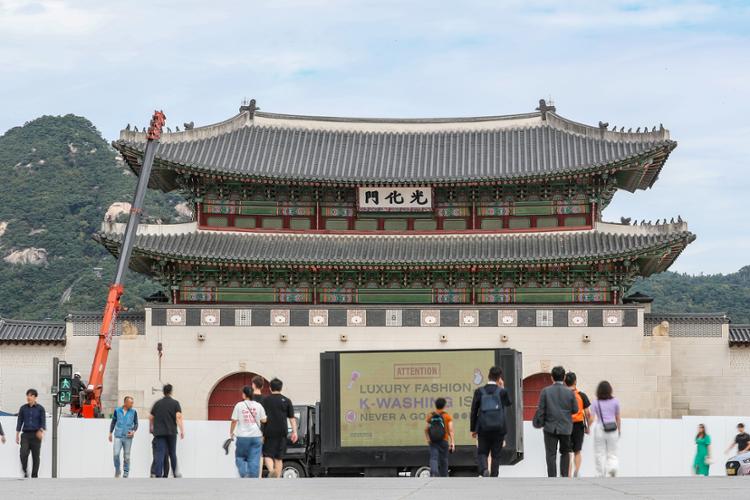
A truck deployed by global K-pop fandom initiative Kpop4Planet, which features a video screen highlighting “K-washing,” passes by Gwanghwamun Square in central Seoul, Monday. Courtesy of Kpop4Planet
Chanel, Celine, Dior and Saint Laurent fail in their climate commitments in 2021
By Lee Hae-rin
Global K-pop fans orchestrated international protests across six major cities including Seoul, Monday, urging luxury fashion brands to take action to tackle the climate crisis.
Kpop4Planet, the digital climate initiative led by global K-pop fandoms, launched the campaign titled “Unboxed: High Fashion, High Carbon” across the capital.
“Global K-pop fandom consists of many young people and we are highly conscious of the future of this planet we are living in and the environmental issues we face. We are inspired by the idols that we follow who have also spoken up to raise awareness, too,” Park Jin-hui, a 24-year-old campaigner and NCT Dream fan, told The Korea Times at the rally.
The campaign called on four major luxury brands ― Chanel, Celine, Saint Laurent and Dior ― to commit to 100 percent renewable energy in their supply chain by 2030, set an absolute emissions reduction target of up to 48 percent by 2030 and provide full transparency in their supply chains.
Video trucks displaying six global K-pop fan clubs’ messages, such as “K-pop fans care about the environment. Luxury brands go green for our future!” and “No fit should cost us the environment ― switch to solar and wind!” appeared at the brands’ houses in Seoul’s Seungsu and Cheongdam as well as the city’s landmarks including N Seoul Tower on Mount Nam and Gwanghwamun Square.

A truck deployed by global K-pop fandom initiative Kpop4Planet, which features a video screen urging luxury brands to cut carbon emissions in Korean, passes the House of Dior in Seoul’s Cheongdam area, Monday. Courtesy of Kpop4Planet
Park explained that the campaigning methods were like-minded K-pop followers’ way of mobilizing internationally to make their voices heard, for example, Park explained.
The trucks also appeared in major fashion districts and landmarks, including Times Square in New York, the Eiffel Tower in Paris and Trafalgar Square in London, she said.
Earlier this month, the group and a global campaigning community, Action Speaks Louder, revealed assessments of the climate commitments of the four luxury labels ? Chanel, Celine, Dior and Saint Laurent ― based on their carbon emission and energy consumption information, which were revealed by their parent companies.
The four brands are represented by K-pop giant Blackpink members Jennie, Lisa, Jisoo and Rose as brand ambassadors, respectively.
According to a report, released in August, the brands’ carbon emissions from 2021 increased from the previous year and amounted to 9.3 million tons. The figure is over half of the amount emitted by global textile exporter Cambodia at 16.9 million tons.
The report underscored that all four brands failed in their climate commitments, giving Saint Laurent, which is owned by Kering, the highest with a “D.” Celine and Dior, both owned by conglomerate LVMH, scored an “E,” while privately-owned Chanel ranked lowest with an “F.”
“Blackpink has shown action and support for the planet as climate advocates and for the fight against global warming. Blinks are really proud of these actions and do not want the girls’ work to be dirtied or ruined by the greenwashing of these brands,” said K, the organizer of the Blackpink France fanbase.
Blackpink highlighted the climate issue by releasing a video in November before COP26, the 2021 United Nations climate change conference in Glasgow, where its members urged their 60 million YouTube subscribers to take action against climate change.
“K-pop fandom has a unique and unprecedented characteristic of concerting collective efforts to boost their idols’ status by campaigning and spreading positive social influence,” music critic Kim Jakka told The Korea Times.
He explained that international K-pop fanbases’ culture of making donations and engaging in social movements has expanded to environmental issues.
Music critic Lim Hee-yun echoed Kim’s view, pointing out that the Korean music genre has grown as a “loudspeaker for opinions of the young generation,” while the growing diversity of K-pop followers is key to driving fan engagement in deeper and wider discussions on contemporary issues.
“K-pop fans are generally highly aware of diversity issues and marginalized groups in their approach to the world … and based on their strong solidarity and strong media influence, K-pop fandom became able to spread their opinions across the globe in the most efficient and fastest manner,” he said, highlighting their potential to spur momentum in climate advocacy.

